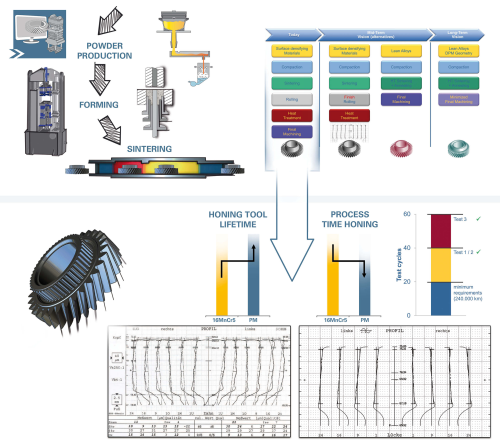
The company says that it produces the widest range of sintered drivetrain components from metal powder worldwide.
Engineers at GKN have been working to improve manual and automatic gearboxes along with universities and renowned research institutions, such as the Laboratory for Machine Tools and Production Engineering (WZL) at RWTH Aachen University, which specialises in materials science and drivetrain technologies
During the VDI Drivetrain Congress GKN will present these gear developments as well as other products in its portfolio that have a lightweight design.
“Powder metallurgy is a pioneering technology,” said Antonio Casellas, vice president of GKN Sinter Metals Global Product Management. “It offers a variety of process options with specially designed metal powders to meet the increasing demands of the various drivetrain applications. Powder metal offers new possibilities in geometry, such as undercuts, ‘green-in-green’ technology or helical gears to innovate gearbox design.”
GKN’s drivetrain products are made using the following processes.
Conventional compaction
Conventional compaction of selected metal powders on GKN developed powder presses using ‘closed-loop’ technology ensures densities above 7.2 g/cc with a homogeneous material structure. The ‘closed-loop’ method developed by GKN allows geometries such as undercuts or the innovative ‘green-in-green’ technology. The surface density is further improved by a subsequent sizing operation.
Warm compaction
Utilizing warm compaction, a technology developed by GKN, a density of more than 7.35 g/cc is achieved. The powder has been engineered to be compacted in heated tooling. Again, the ‘closed-loop’ process is used.
Selective rolling
Rolling of selected functional surfaces serves to achieve full density in highly stressed contact areas of the drivetrain component. Helical gears can be provided with a heavy-duty surface area and an elastic core with a supporting strength to optimise application performance.
Powder forging
Due to its outstanding design flexibility and excellent performance with good geometrical precision, powder forging is an ideal technology for producing drivetrain components because a nearly full density is achieved across the entire volume of the part. In this process, a PM part having a compact density of approximately 7.0 g/cc is fed directly from sintering into a forging press. It is then brought to full density by hot forging.





